Your Blog Received a Copyright Infringement Penalty - Now What?
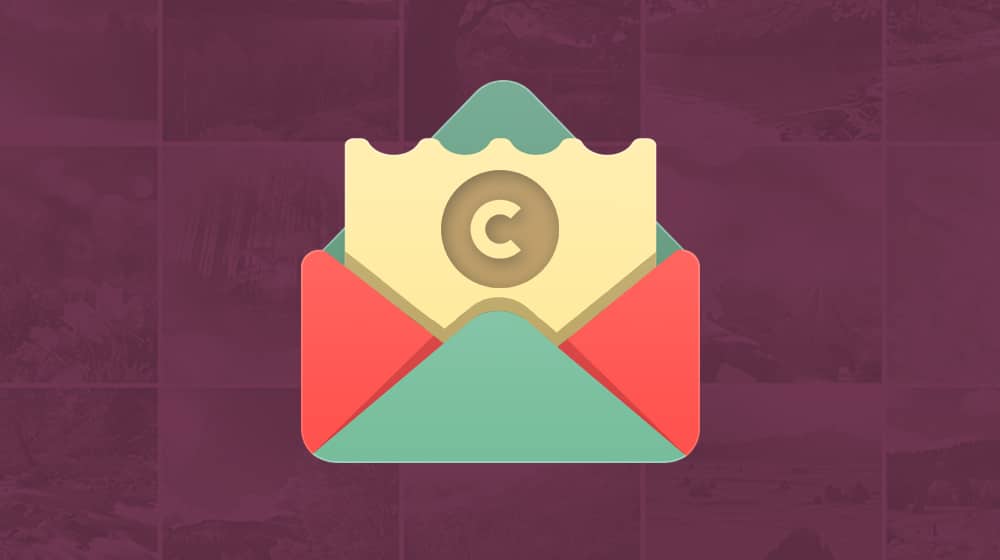
Copyright issues are a persistent point of focus for bloggers, publishers, and website owners.
On one hand, copyright protection and intellectual property are great ideas. Ideas, but more than ideas - the implementation of ideas needs to have some kind of protection. I wouldn't want someone to copy everything on my site, turn the yellow into green, change the name to Content Proven, and start making money from my work. Disney doesn't want anyone making Mickey Moose cartoons and making money from it either.
Oh, there's room for unique expressions of ideas, and there should be. A parody involving Mickey Mouse isn't illegal, as much as Disney might want it to be. Fair use, using clips of Mickey Mouse to review Disney's practices, isn't illegal either. Not even Disney can silence criticism.
The problem comes when copyright is leveraged in intensely negative ways. That's the other hand, the other side of the coin. We're seeing it every day with YouTube, and the constant battles with Content ID.
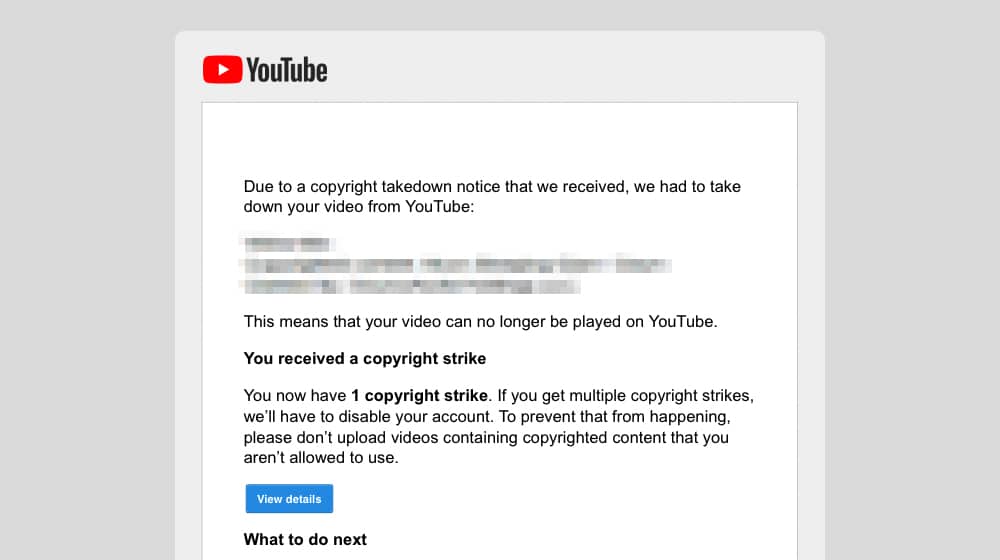
Thousands of creators are pushed out of the game simply because some copyright troll somewhere decides to flag some of the audio, and the burden of proof is on the creator, not the claim. Every month, you can find ever-more egregious examples, where creators have songs that are misidentified but are stuck with copyright claims. Covers and fair use are squashed by draconian and unreviewed algorithms.
Artists, too, face this. The modern world of freelance art requires using social media to post artwork, showcase talent, and build a following that might someday be monetized. And yet, there are thousands of "companies" that are little more than bots leveraging print-on-demand services to sell stolen artwork on mugs, shirts, and phone cases. It's an intensely pervasive problem.
Then you have broad misunderstandings of copyright. Believe it or not, there are still people out there who, every day, write blog posts and fill those posts with images they find through Google Image Search. They believe "If it's there online, I can use it." "If you posted it, that means anyone can do whatever they want with it." Try as you might, a creator has an impossible time squashing this attitude.
All of this leaves us in muddy waters. Copyright is good and necessary, but the system was created before the internet even existed, and has decidedly not evolved with the times. It's a constant legal battle on the fringes, with lawyers equally passionate on both sides. There needs to be some form of protection available for publishers, but there needs to be recourse as well.
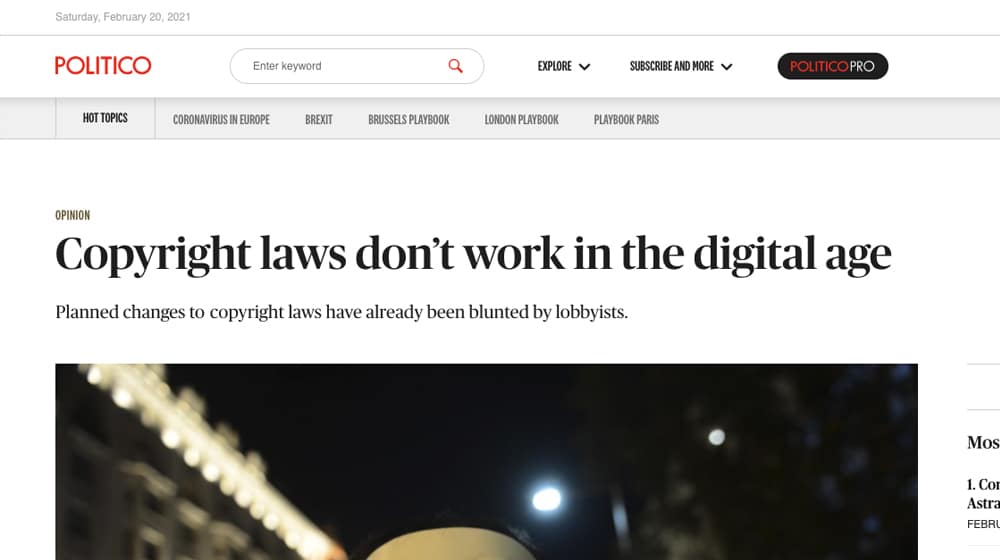
To give you an idea of what you might be looking at, just think of a few scenarios.
- You want to write a blog post about Omaha, Nebraska, and you find a photo of the city to use. It's a public space; anyone can go there with a modern phone and take a nearly identical picture, more or less. Yet, you can't use their picture, because you didn't go take it; someone else did, and they need to be credited and compensated for their work if you use it unless they otherwise permit you to use it.
- You want to create an explainer video for your product, and you figure you'll use some classical music. Classical music from 400 years ago is well outside of copyright protection and is thus under the public domain. Unfortunately, specific performances of that music are copyrighted, and using the wrong one can earn you steep penalties. You can use the music, but you need an original performance, or one licensed to you to use.
- You want to host user-generated content, developing a site like Imgur. What happens when users post content they don't own the rights to post? It's going to happen; indeed, it happens millions of times a month on Imgur itself. Current copyright protections allow for punishing the poster, but not the site hosting the content. This "safe haven" clause is on the cusp of being removed and would destroy sites like Imgur that rely on it to exist. Not to mention sites like YouTube, which would be penalized for every single song or every video published on the site without the consent of the creator, racking up trillions of dollars in fines and damages.
You can see that there's no easy, simple answer to the copyright problem. All you can do, as a content creator, is strive to stay on the right side of the law.
You Received a Copyright Notice
Now let's say you've received a copyright notice. Maybe it came in through YouTube on your business YouTube channel, flagging some piece of music or clip of video you published. Maybe it came from your web host, as part of a Digital Millennium Copyright Act (DMCA) takedown of a piece of content on your site. Maybe it came directly into your inbox, a legal notice from a lawyer (or from a copyright troll) trying to get your attention about the impending legal action. Maybe your site is just penalized by Google for violating copyright, however, they've decided to detect such violations.
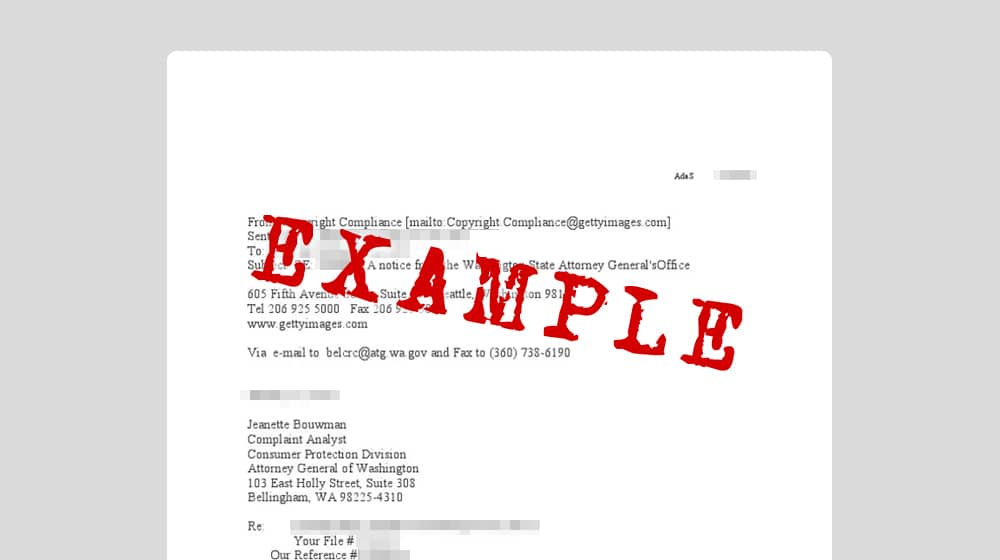
How do you deal with this situation?
After all, copyright violations are terrifying. They're designed to be terrifying, and they penalize big businesses and strongly disincentivize copyright violations, which means they can be utterly back-breaking. Copyright infringement, depending on the situation, can result in penalties of up to $150,000 per violation, plus criminal charges. The maximum penalty is rarely leveraged, particularly against small sites and incidental violations, particularly when action is taken to remedy the situation right away. For a small business, this can be enough to not just destroy the business, but the lives of the owners as well.
So, what do you do?
What you don't do is ignore it. Ignoring a copyright notice and hoping it goes away will more than likely result in even worse penalties. However, this doesn't mean that you should immediately respond either. Remember, the legal process is slow even in the best of circumstances. You have time to sit back, take a deep breath, and think things through.
Step 0: Relax
Copyright violations are scary, and copyright law is a labyrinth, so it's understandable to panic. Whatever you do, don't respond in a panic. If, and that's if, the notice is real, you don't have to navigate the law alone. You will need to get a lawyer to handle it, and sure, that's stressful, but it's not immediate. No one is knocking at your door ready to take a lead pipe to your kneecaps here. Take a deep breath, relax, and continue when you're ready.
Step 1: Research
You need to research who is sending you this notice. There are three possible situations you might find yourself in.
- The copyright violation is legitimate, the notice comes from a legitimate copyright holder or law office, and you will have to deal with it appropriately, likely paying a penalty.
- The copyright violation is mistaken; you have a license to use the content, and the copyright holder got their wires crossed and filed a notice in error.
- The copyright violation is fake; you have a license to use the content (or you created it yourself) and the notice is someone trying to scare you into paying them without realizing the scam.
- Where was the claim filed? Is it a legal notice in your inbox, a letter at your headquarters, or notice filed through a third-party system like Google or YouTube? Depending on the source, you may have specific steps you need to take to refute it.
- Run a reverse image search with Google Images, TinEye, or a comparable reverse image search engine. Were you able to find the original? Is it in fact a premium-licensed photo belonging to the company that send you the notice?
This should help you determine if the company has sent these in the past, if it's real, and if it's something you should take seriously.
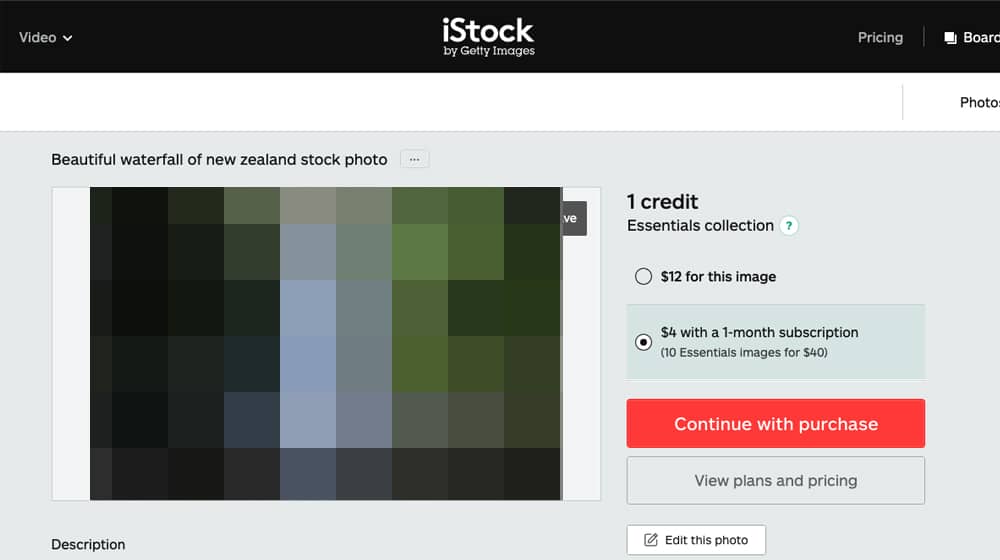
Once you determine the above information, what should you research?
- Identify the content that is supposedly in violation. What is it, where is it hosted, where did you get it from initially? Some sources are legal but have sketchy terms and others are legitimate but might make a mistake.
- Identify the copyright claimant. This is the identity of the person or entity filing the claim. The song performer, the photographer, the record label that holds the rights, that kind of thing. You want to make sure this person is a) real and b) legitimately holds the copyright to the content.
- Identify the entity filing the claim. There are a lot of companies and lawyers out there who exist solely to file as many copyright claims as they can on as thin a justification as they can. Take a look at this list to get an idea of what you might be looking at.
You should also figure out where the content came from. For example, if you're an agency that hires writers or graphic artists to create content for you, identify who wrote or produced the content and ask them where they got the violating item in question. If you're the one who got it yourself, well, then you only have yourself to blame.
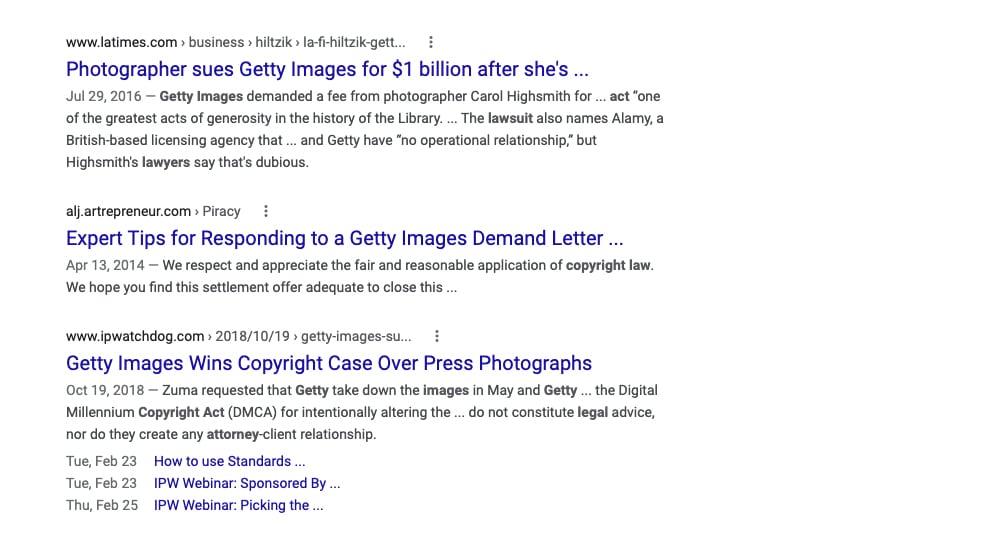
Getty Images is particularly vicious about this kind of thing. They're one of the largest and most prolific stock image sites in the world, and they charge a premium for their stock photos, require attribution for everyone, and worse, have very restrictive license terms. For example, it doesn't matter if an agency has a license to use a photo; if they use it on your blog, you need a license as well.
Worse, Getty is very aggressive about pursuing these kinds of violations, which is why not just the company as a whole but a dozen of their executives and "copyright specialists" are listed in that copyright troll site. They explicitly make it difficult to navigate copyright through them and aggressively penalize you for messing it up.
Additionally, if there are other penalties leveraged because of the violation, such as deindexing from Google or a copyright claim on YouTube, you may need to pursue a specific process to refute the claim. For example, here is the process for refuting a Content ID claim on YouTube.
Let's move onto the next step.
Step 2: Remove the Content
If you've determined that you're violating copyright by using content you don't have the rights to use, it's time to remove/replace the content.
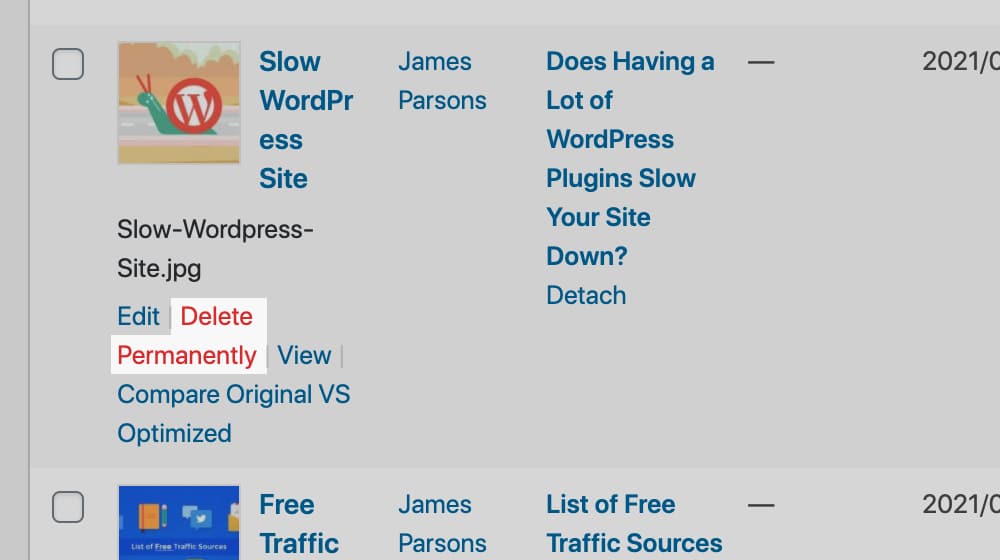
Now, it's important to recognize that removing the content does not remove the penalty. Likewise, some other things that do not invalidate a copyright claim include:
- Doing it without realizing it. Ignorance is not a defense against legal violations.
- Resizing a picture. Altering the dimensions of a photo is not a significant enough change to constitute fair use. Fair use is extremely complicated. I recommend checking out Leonard J. French (and his YouTube channel); he does a great job of reviewing interesting cases and discussing the ins and outs of copyright.
- You cite the source. Citing the source of a photo does not give you permission to use it unless the photo is published under a Creative Commons license requiring attribution.
- You haven't made money, or no one has seen the post. You don't need to profit from a copyright violation in order to be penalized by it.
There's also the oh-so-common "Nothing on this site is our content, all content belongs to its creator" disclaimer that many pirate sites will add to their stolen content. Not only is this not a defense - it's often evidence of willful violation over unknowing violation and can make your penalties worse.
In any case, removing the content that is in violation of copyright will need to happen sooner or later. You might as well remove it immediately. Remember, though, that part of filing a legal notice involves gathering evidence; if there was a violation there, you won't be able to hide it. At the very least, the law office and/or copyright holder will have taken screenshots.
Step 3: Determine a Course of Action
Here, you have three choices.
- You can ignore the notice and hope it goes away. If it's a troll and it's a false claim, you're fine to do this. If it's a real claim, this will make things worse for you later.
- You can respond to the notice yourself. Chances are you won't be able to do much arguing; your best chance is to negotiate the bill for using the image down to something more reasonable. Other people in this position have researched the cost to license the image for the period of time that they used it, and used that price as a reasonable counter.
- You can hire a lawyer.
Lawyers are generally the correct option, but as we all know, they can be very expensive. A good copyright lawyer often charges $3,000 for a retainer. In fact, copyright trolls know this too, which is why they'll only demand a fee that is less than that, around $500 or $1,000. They want to make it more expensive to fight them than it is to pay them to increase their success rate and thus increase their revenue.
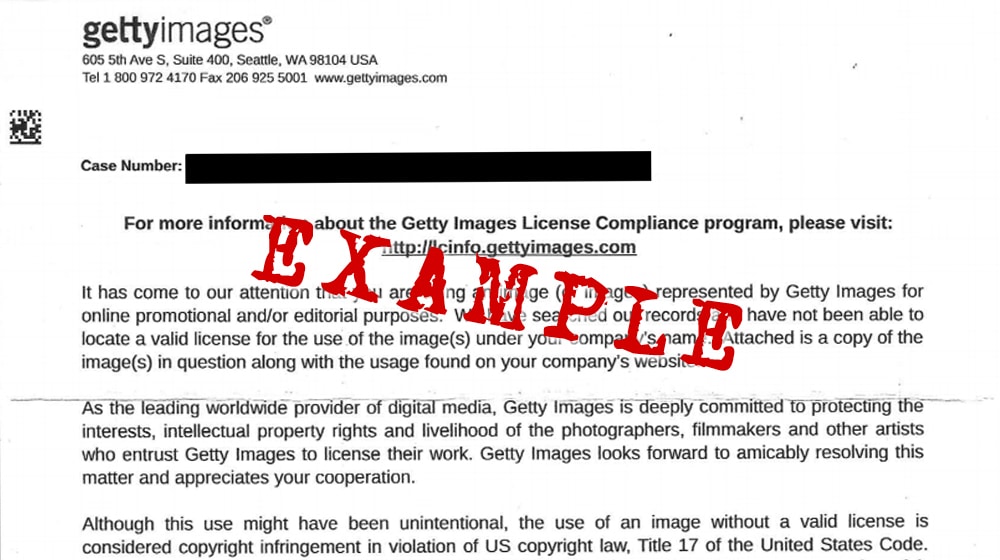
Often, if you ignore a notice, the company will come back with a higher penalty to try to scare you into paying. Getty is notorious for this. They escalate and escalate until someone breaks.
A lawyer can help determine if a claim is legitimate, and can file the appropriate actions as necessary. They can advise you whether or not you should pay, or you should fight.
Here's where things get interesting, particularly with copyright trolls. Many of them have never taken anyone to court. They may have a few real legal cases under their belts, which they use to show they're serious, but 90% of the time they don't want a court battle either. After all, their lawyers are expensive too. More often, according to OneHourProfessor, they will simply turn the bill over to a debt collector who will be happy to hound you endlessly in an attempt to get their pound of flesh:
"If Getty Images is still unsuccessful with those attempts to get you to settle, they will turn your information into a collection agency who will then tell you that you owe them for the settlement."
If the copyright claim is legitimate, fighting it can lower penalties, but it won't get you out of the situation entirely. If it's a troll or a false claim, getting a lawyer to counter it can free you from the burden entirely.
Additionally, there are some lawyers who will take on copyright cases for a cheaper fee than the stated $3,000 retainer. They know the tactics used to try to make it a bad value proposition for you, and they take on work for a lower fee, or even pro bono. The Electronic Frontier Foundation often helps with these cases, for example.
Step 4: Prevention
Once all is said and done, if you were in actual violation of copyright, you'll have to pay something. Once you do, it will go away, but other companies might see blood in the water and start looking at your site for more examples of copyright violations. It's your responsibility to make sure no more can be found, and that no more will happen in the future.
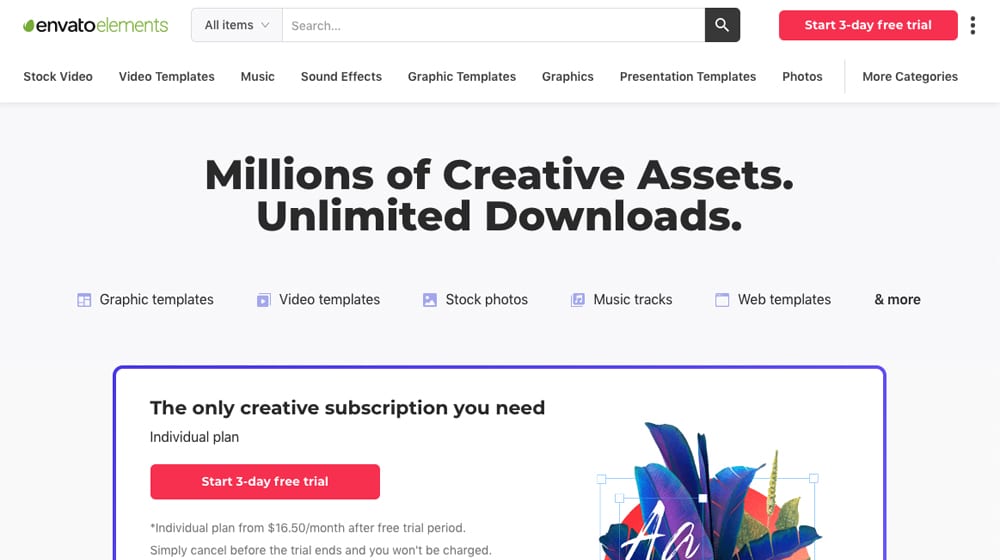
I recommend:
- Hiring a photographer and/or artist to produce original content for your use.
- Creating content on your own.
- Signing up for more legitimate stock photo sites.
Copyright is tricky to navigate, and that's why you need to make sure you're creating as much of your content as you can and are paying for a legal license for anything you aren't creating. It helps to have a lawyer you're familiar with to ask in times of trouble, but if you've never been hit with a claim, I don't know that I would go out and talk to one just yet. Just be careful moving forward.
Have you been hit with a copyright infringement claim, recently or in the past? What has your experience been like? More importantly, if you resolved the issue, what did you do? We'd love to hear from you, and your comment will help others. Please share with us in the comments section below!



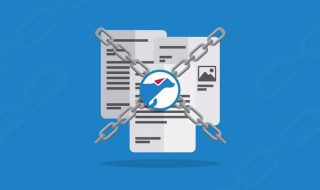




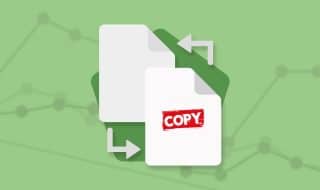

May 20, 2021
I haven't experienced it yet but it's a good read. Getting a notice for copyright is scary and the only thing that will cross your mind is to get a lawyer (Imagine the cost!) when you can handle the situation in a different and hopefully costless way. Thank you for sharing this!
May 21, 2021
Hey Gary, thanks for your comment and for stopping by! Glad it was informative.
April 11, 2022
This is great to know but I hope I won't ever need to use this advice.
April 29, 2022
Thanks, Chris!
I hope you never receive one of these letters, too. A handful of our clients have received these letters from content they published before working with us.
They are persistent, especially when you respond to them - they know they have a live one on the hook! 😉
Note for anybody reading this - you can almost always negotiate with them to lower your settlement amount. These companies would prefer to get a small payout than nothing at all.
September 21, 2022
Thanks for sharing that. We're currently debating how to negotiate with Getty to lower the settlement.
October 07, 2022
Ah man. I hope it goes well. Good luck!